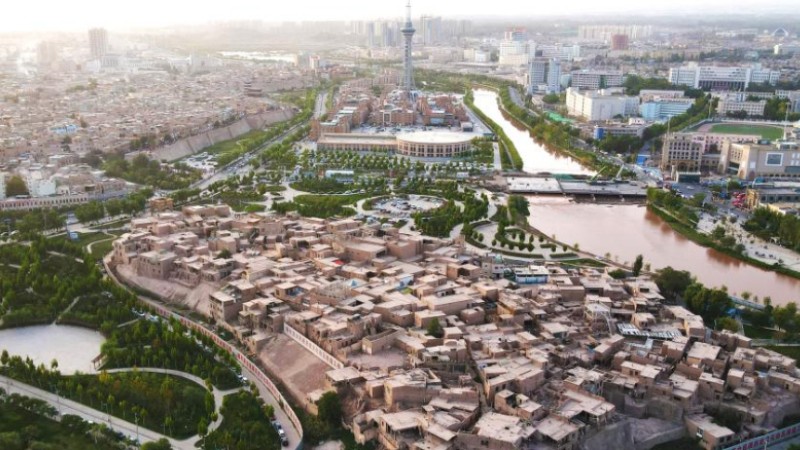China's transformation brews in a cup of coffee
BEIJING, Sept. 12 (Xinhua) -- As the latest craze for latte with the flavor of China's famous liquor Moutai swept across the country, coffee lovers are vying to share pictures on social media of coffee infused with different flavors like rice wine, tea, ginseng and even creamy popsicles.
"The coffee industry in China has developed rapidly in the past decades, yet there is still a massive untapped potential," said 46-year-old Ji Zhonghua, a coffee enthusiast from northeast China's Jilin Province. Ji believes that coffee, once considered a luxury, has now evolved into an everyday beverage with improved quality and a diverse range of flavors, mirroring the transformations China has undergone in recent decades.
Last week, China's domestic coffee brand Luckin launched the "sauce-flavored" latte laced with alcohol claimed to be from the luxury brand Kweichow Moutai. According to Luckin, 5.42 million cups of the drink were sold on the first day of its launch, with the sales of the single product topping 100 million yuan (about 13.9 million U.S. dollars), setting a new sales record for the coffee chain.
The latte drink was in such high demand that at numerous outlets, it sold out within hours over the past several days. Ji said she hasn't had the opportunity to try this new product, but she believes that its overwhelming popularity is a positive sign for the development of China's coffee industry.
FROM LUXURY TO EVERYDAY DRINK
Although the first coffee seeds reached southwest China's Yunnan Province over 130 years ago, coffee remained a distant concept from the everyday lives of most ordinary Chinese people. It wasn't until the era of reform and opening up that they began to enjoy increased exposure to foreign cultures, with coffee, symbolizing Western culture, quickly garnering fans.
Ji started drinking coffee about 23 years ago. "At that time, most people tried the drink simply out of curiosity, while some indulged in coffee solely for its refreshing qualities," she recalled, adding that she could only find instant coffee on the shelves of stores back then.
In the following years, she witnessed coffee gaining increasing popularity among ordinary people, becoming part of their lives.
According to a report on the coffee industry's development in Chinese cities, which was released by the Hongqiao International Coffee Port together with Chinese e-commerce platform Meituan, Shanghai Jiao Tong University and some other institutes this May, last year about 125,000 tonnes of coffee beans were imported into China, almost doubling the number in 2017. And Chinese mainland now boasts more than 132,800 cafes, up more than 31,000 from 2021.
The U.S. coffee giant Starbucks opened its first store on the Chinese mainland in 1999. To date, it has operated about 6,500 stores in more than 250 cities on the Chinese mainland.
The fervor for coffee is evident not only in major metropolises like Shanghai and Beijing but also in smaller cities like Yanji City in Jilin, which has a population of less than 690,000. The number of cafes in Yanji has grown to 800 now from about 300 at the beginning of this year.
In 2018, Ji Zhonghua opened her first cafe offering hand-brewed coffee. "Initially, we needed a guide to introduce coffee culture to the customers and tell them the difference between various coffee beans," said the owner, adding that in recent years, however, customers would choose their favorite beans straight away and engage in professional discussions with the staff about bean handling. She is now preparing to open her third cafe later this year.
Cheng Cheng, the owner of a supermarket in Hangzhou, capital of east China's Zhejiang Province, has also observed this transformation. "I began selling instant coffee over 10 years ago," he said. "In the past decade, we have had more foreign brands, and the sales of instant coffee have continued to drop while demand for coffee beans increased."
CHINESE STYLE COFFEE
As Chinese consumers increasingly seek higher-quality coffee, businesses across China have introduced a wider array of flavors, often by infusing coffee with local foods and drinks to cater to the diverse preferences of the customers.
Much like how Luckin impressed customers with coffee blended with various Chinese tea varieties and seasonal fruits, Starbucks in Shanghai introduced a drink with the flavor of yellow rice wine, a typical beverage of east China, and it has been a signature product for the past six years.
In the small border city of Yanji, coffee infused with the delightful essence of a special local pear is a popular product. According to a cafe nestled near Yanbian University, they manage to sell as many as 1,000 cups of this delectable brew in a single day. Other flavors like ginseng and creamy popsicles are also quite popular.
Bai Ming, a researcher with the Chinese Academy of International Trade and Economic Cooperation under the Ministry of Commerce, told Xinhua that the shifting preferences of Chinese consumers can be attributed to the transformation and upgrading of China's economy, improvement in people's living standard, as well as the ensuing consumption upgrading and diversification.
Lao Fei, an associate professor at the China Agricultural University and an expert in coffee product development, shared similar perspectives.
"In China now you can always find the coffee that you want, with different flavors and prices," she said. "Today, coffee serves as a beverage enjoyed during office work or social gatherings with friends. But when compared to other countries, coffee in China is more inclusive, with new flavors coming out that people love to try."
The "sauce-flavored" latte, in particular, showed people's confidence in and recognition of Chinese traditional culture, she added.
Ji Zhonghua said she wishes to see more collaboration between coffee brands and other food and drinks in China, which could boost the development of the coffee industry. "Over time, the popular ones will be left to become classic, and become part of our own coffee culture."
Photos
Related Stories
Copyright © 2023 People's Daily Online. All Rights Reserved.









